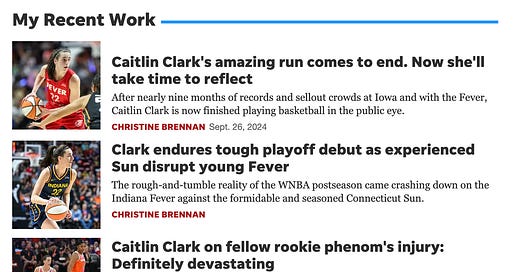the WNBA players' unprecedented stand against 'biased' reporting
and why the statement addressing reporting from USA TODAY's Christine Brennan was about more than just one incident
Thanks for being here! Below, a deep dive into the women’s basketball reporting that USA TODAY’s Christine Brennan has published this season, which prompted a response from the Women’s National Basketball Players’ Association. A disclaimer that this is not intended as an attack on Brennan personally, and, as you will see below, I have tried to directly …
Keep reading with a 7-day free trial
Subscribe to Out of Your League to keep reading this post and get 7 days of free access to the full post archives.





